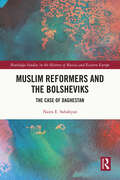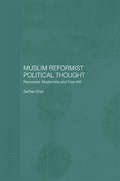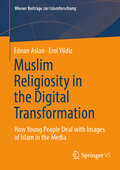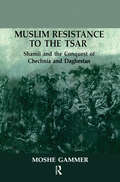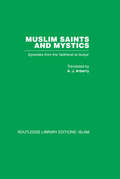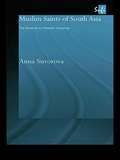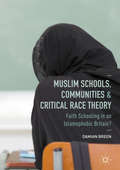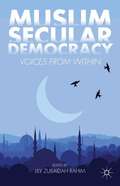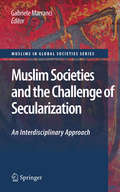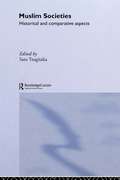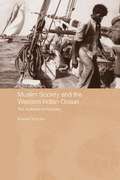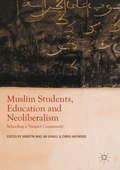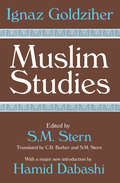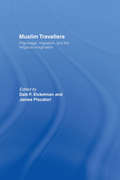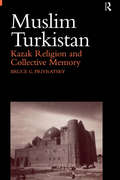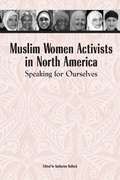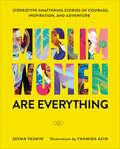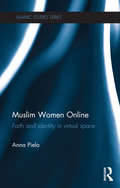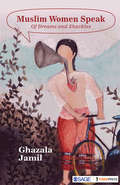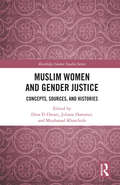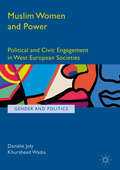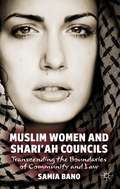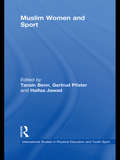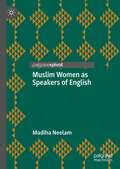- Table View
- List View
Muslim Reformers and the Bolsheviks: The Case of Daghestan (Routledge Studies in the History of Russia and Eastern Europe)
by Naira. E SahakyanThis book explores how the Muslim scholars of Daghestan, an important Muslim region within Russia, experienced the 1917 Russian Revolution and how they attempted to gain religious and political authority in the new post-imperial environment. Covering the period between the February Revolution and the first massive repressions of the scholars of Islam, it provides new insights into the complexities of the relations between Muslim reformers and Bolsheviks. It challenges the prevailing view in Western scholarship that the relationship was antagonistic, revealing that relations were pragmatic rather than ideological. It argues that there was cooperation on issues of modern education and language policy, and alliances against assumed common threats, such as the British, Wahhābis and local Ṣūfīs, along with disagreements related to the Bolsheviks’ atheism and their concept of class struggle. Overall, it demonstrates that the Islamic reformist discourse in Daghestan, although influenced by the wider Islamic debate at the turn of the twentieth century, was an integral part of Soviet modernity.
Muslim Reformist Political Thought: Revivalists, Modernists and Free Will (Central Asia Research Forum Ser.)
by Sarfraz KhanThere are two main trends distinguishable amongst Muslim reformists - revivalists and modernists. This book charts and analyses the main trends of Muslim reformist political thought in Bukhara. It is the first to utilize original sources preserved in Soviet archives that were previously inaccessible to western scholars. The author has translated numerous original documents from Tajiki and Russian into English. This book thus serves as a useful resource for students of Islam, Central Asia, the former Soviet Union, and of law, politics and philosophy.
Muslim Religiosity in the Digital Transformation: How young people deal with images of Islam in the media (Wiener Beiträge zur Islamforschung)
by Erol Yildiz Ednan AslanThe effects of social media can be observed particularly in relation to the religious commitment and religious practices of young people - who today are summarized under terms such as "internet generation", "media generation" or "digital natives". Online media exert a major influence on their lives, their understanding of the world, their religious orientations and actions. Their identity constructions, their cultural and religious orientations are closely intertwined with social media. This is precisely where the present study started with the question of what subjective consequences interaction on the social web has for the religious orientations, practices and self-conceptions of Muslim young people in Austria. The focus was on the connections between media use, media images of Islam and lived religiosity. On the one hand, the results show that the use of social media creates objective spaces of opportunity that can go hand in hand with an expansion of individual scope for action, whereby religious authority is increasingly being questioned. On the other hand, the study also shows that the use of digital media can also lead to a narrowing of individual religious orientations.
Muslim Resistance To The Tsar: Shamil and the Conquest of Chechnia and Daghestan
by Moshe GammerMuch has been written about the Muslim Murid movement and its leader Shamil, who resisted the Tsarist Russian expansion into Chechan and Daghestan for more than quarter of a century. This study, based on research in multilingual archives, offers a fresh insight into this controversial subject.
Muslim Saints and Mystics: Episodes from the Tadhkirat al-Auliya' (Memorial of the Saints)
by Farid al-Din AttarThis is a major work of Islamic mysticism by the great thirteenth-century Persian poet, Farid al-Din Attar. Translated by A J Arberry, Attar’s work and thought is set in perspective in a substantial introduction.
Muslim Saints of South Asia: The Eleventh to Fifteenth Centuries (Routledge Sufi Series)
by Anna SuvorovaThis book studies the veneration practices and rituals of the Muslim saints. It outlines principal trends of the main Sufi orders in India, the profiles and teachings of the famous and less known saints, and the development of pilgrimage to their tombs in India, Pakistan and Bangladesh. A detailed discussion of the interaction of the Hindu mystic tradition and Sufism shows the polarity between the rigidity of the orthodox and the flexibility of the popular Islam in South Asia.
Muslim Schools, Communities and Critical Race Theory
by Damian BreenThis book explores the position of Muslim schools in contemporary Britain. A Critical Race Theory approach is used to consider some of the specific issues faced by Muslim schools, in particular those looking to become state-funded. The book provides a critically considered and meaningful application of a theory of 'race' to Muslims as a religious community, without restricting the analysis to minority ethnic Muslim groups; it also provides a counter-narrative which contests assumptions about Muslim schools presented in the media and in public debates more generally. These insights are positioned against current political climates within which Muslims have been consistently subjected to surveillance and suspicion. The book draws on first-hand research carried out inside Muslim schools to offer insights into the ways that these schools cater to diverse and locally-specific needs. It concludes by arguing that independent Islamic schools represent ideal models of community need. Therefore, bringing such schools into the state sector, in a way that allows them to retain autonomy, represents an ideal strategy for the educational and political enfranchisement of British Muslims. Muslim schooling represents an opportunity for increased state investment in Muslim interests as a strategy for offsetting the ways in which Muslim communities have been marginalised more generally in contemporary political climates. The book will make compelling reading for students and researchers in the fields of Education, Sociology, and Religious Studies, particularly those with an interest in faith schools, Islam, and Critical Race Theory.
Muslim Secular Democracy
by Lily Zubaidah RahimThe book offers a nuanced and innovative analyses of the emergence of an inclusive secular democratic state paradigm which incorporates the sacred within the framework of secular democracy in the Muslim World.
Muslim Societies and the Challenge of Secularization: An Interdisciplinary Approach
by Gabriele MarranciScholars from various disciplines worked together to present the first interdisciplinary book to address the issue of Islam, secularism and globalization. The book has a clear structure which represents its interdisciplinary approach: the first section addresses the philosophical and historical discussion about Islam and secularism; the second section discusses the topic from an ethnographical and social anthropological viewpoint; and the final section addresses Islam, secularism and globalization from a political viewpoint. This unique collection not only offers innovative research and new material, it also provides empirical examples and theoretical debates, and could therefore also be used as a textbook for courses on Islam, globalization, anthropology, politics, sociology and law.
Muslim Societies: Historical and Comparative Aspects (New Horizons in Islamic Studies)
by Sato TsugitakaThis volume examines Muslim societies across Europe, North Africa, Central Asia and South Asia from the eighteenth century to the present, providing fresh insight through comparison. Movements and populations covered include the nineteenth century North African Sansusi movement and its relationships to Sufis and Arabs of the region, Soviet and Chinese Central Asia, Muslim-Hindu relationships in South Asia, Muslims in Syria and Muslim immigrants in Europe.
Muslim Society and the Western Indian Ocean: The Seafarers of Kachchh (Routledge Indian Ocean Series)
by Edward SimpsonBased on substantial ethnographic, textual and archival research, this interesting book offers a new perspective on the anthropology of the western Indian Ocean. Writing in a clear, engaging style, and covering an impressive range of theoretical terrain, Simpson critically explores the relationships between people and things that give life to the region and drive shifting patterns of social change among Muslims in the highly-politicized state of Gujarat. Scholars of the Indian Ocean, Muslim society in South Asia, and Hindu nationalism, as well as anthropologists in general, will find this a fascinating read and a major contribution to research in this area.
Muslim Students, Education and Neoliberalism
by Chris Haywood Máirtín Mac an GhaillThis edited collection brings together international leading scholars to explore why the education of Muslim students is globally associated with radicalisation, extremism and securitisation. The chapters address a wide range of topics, including neoliberal education policy and globalization; faith-based communities and Islamophobia; social mobility and inequality; securitisation and counter terrorism; and shifting youth representations. Educational sectors from a wide range of national settings are discussed, including the US, China, Turkey, Canada, Germany and the UK; this international focus enables comparative insights into emerging identities and subjectivities among young Muslim men and women across different educational institutions, and introduces the reader to the global diversity of a new generation of Muslim students who are creatively engaging with a rapidly changing twenty-first century education system. The book will appeal to those with an interest in race/ethnicity, Islamophobia, faith and multiculturalism, identity, and broader questions of education and social and global change.
Muslim Studies: Volume 1
by George McCueThis is the first volume of Goldziher's Muslim Studies, which ranks highly among the classics of the scholarly literature on Islam. Indeed, the two volumes, originally published in German in 1889-1890, can justly be counted among those that laid the foundations of the modern study of Islam as a religion and a civilization. The first study deals with the reaction of Islam to the ideals of Arab tribal society, to the attitudes of early Islam to the various nationalities and more especially the Persians, and culminates in the chapter on the Shu'ubiya movement which represents the reaction of the newly converted peoples, and again more especially the Persians, to the idea of Arab superiority. The second essay is the famous study on the development of the Hadith, the -Traditions- ascribed to Muhammed, in which the Hadith is shown to reflect the various trends of early Islam: Goldziher's name is mainly associated with the critical study of the Hadith, of which this essay is the chief monument. The third essay is about the cult of saints, which, though contrary to the spirit and letter of the earliest Islam, played such an important part in its subsequent development. These essays, with the author's marvelous richness of information, profound historical sense, and sympathetic insight into the motive forces of religion and civilization, are today as fresh as at the time of their original publication and their reissue is indispensable for the growing number of students of Islam. Hamid Dabashi contributes a major eighty-five-page study of Goldziher's life and scholarship, situating both in the intellectual and political currents of his own time while evaluating his work in the context of the current debate over Orientalism.
Muslim Travellers: Pilgrimage, Migration and the Religious Imagination (Comparative Studies On Muslim Societies #Vol. 9)
by Dale F. Eickelman James PiscatoriPilgrimage, travel for learning, visits to shrines, exile, and labour migration shape the religious imagination and in turn are shaped by it. Some travel, such as pilgrimage, explicitly intended for religious purposes, has equally important economic and political consequences. Other travel, not primarily motivated by religious concerns and thus neglected by many scholars, nonetheless profoundly influences religious symbols, metaphors, practices and senses of community. These studies, encompassing Muslim societies from Malaysia to West Africa, also suggest how encounters with Muslim `others' have been as important in shaping community self-definition as encounters with European 'others'. This volume brings together historians, social scientists and jurists concerned with pilgrimage, scholarly travel and migration in both medieval and contemporary Muslim societies and explores basic issues. Can 'Muslim travel' be regarded as a distinct form of social action? What role does religious doctrine play in motivating travel and how do doctrinal interpretations differ across time and place? What are the strengths and limitations of various approaches to understanding the transnational and local significance of pilgrimage, migration and other forms of travel? An image of Muslim tradition and change in local communities in relation to travel emerges, which competes with the myth of the universality of the Islamic community.
Muslim Turkistan: Kazak Religion and Collective Memory
by Bruce PrivratskyThis ethnography of Muslim life among the Kazaks of Central Asia describes the sacralisation of land and ethnic identity, local understanding of Islamic purity, the Kazak ancestor cult and domestic spirituality, and pilgrimage to the tombs of Sufi saints.
Muslim Volunteering in the West: Between Islamic Ethos and Citizenship (New Directions in Islam)
by Mario Peucker Merve Reyhan KayikciThis edited volume explores various facets of Muslims’ civic engagement in Western post-secular societies, fundamentally challenging simplistic boundaries between Islamic ethical conduct and liberal-democratic norms and practice.Bringing together scholars from sociology, anthropology, and Islamic theology, the collection offers sound theoretical and empirical elaborations on the complex ways in which Islamic piety, principles and norms interact with, and shape, Muslims’ everyday practice of volunteering as a performance of active citizenship in liberal societies. The contributions cover diverse manifestations of Muslim volunteering in North America, Europe and Australia, from environmentalism to mental health volunteering, and critically examine the national and global socio-political context within which certain forms of Muslims’ civic engagement are viewed with skepticism and suspicion. It will be of use to students and scholars across sociology, political science, community studies and Islamic studies, with a focus on migrant integration, diaspora studies, and inter-ethnic relations.
Muslim Women Activists in North America: Speaking for Ourselves
by Katherine BullockIn the eyes of many Westerners, Muslim women are hidden behind a veil of negative stereotypes that portray them as either oppressed, subservient wives and daughters or, more recently, as potential terrorists. <P><P>Yet many Muslim women defy these stereotypes by taking active roles in their families and communities and working to create a more just society. This book introduces eighteen Muslim women activists from the United States and Canada who have worked in fields from social services, to marital counseling, to political advocacy in order to further social justice within the Muslim community and in the greater North American society.
Muslim Women Are Everything: Stereotype-Shattering Stories of Courage, Inspiration, and Adventure
by Seema YasminWinner of the 2021 International Book Awards Winner of American Book Fest's 2020 Best Book Awards in Women’s IssuesA full-color illustrated collection of riveting, inspiring, and stereotype-shattering stories that reveal the beauty, diversity, and strength of Muslim women both past and present.Tired of seeing Muslim women portrayed as weak, sheltered, and limited, journalist Seema Yasmin reframes how the world sees them, to reveal everything they CAN do and the incredible, stereotype-shattering ways they are doing it.Featuring 40 full-color illustrations by illustrator Fahmida Azim throughout, Muslim Women Are Everything is a celebration of the ways in which past and present Muslim women from around the world are singing, dancing, reading, writing, laughing, experimenting, driving, and rocking their way into the history books.Forget subservient, oppressed damsels—say hello to women who are breaking down barriers using their art, their voices, and their activism, including:Tesnim Sayar from Denmark, a Muslim goth-punk who wears a red tartan mohawk on top of her hijabAmerican superstar singer SZANura Afia, CoverGirl’s first hijabi ambassadorIlhan Omar and Rashida Tlaib, America’s first Muslim congresswomenIlyana Insyirah, a hijaab-wearing scuba-diving midwife from AustraliaShowcasing women who defy categorization, Muslim Women Are Everything proves that to be Muslim and a woman is to be many things: strong, vulnerable, trans, disabled, funny, entrepreneurial, burqa or bikini clad, and so much more.
Muslim Women Online: Faith and Identity in Virtual Space (Routledge Islamic Studies Series)
by Anna PielaWhile issues surrounding Muslim women are common in the international media, the voices of Muslim women themselves are largely absent from media coverage and despite the rapidly increasing presence of Muslim women in online groups and discussions, it is still a relatively unexplored topic.This book examines Muslim women in transnational online groups, and their views on education, culture, marriage, sexuality, work, dress-code, race, class and sisterhood. Looking at both egalitarian and traditionalist Muslim women's views, the author considers their interpretations of Islam and identifies a new category of holists who focus on developing the Islamic sisterhood. Drawing on detailed analysis of online transcripts, she highlights women's rhetorical techniques and the thorough knowledge of Islamic sources which they use to justify their points in online discussions. She details how in the online context, as opposed to offline interactions, Muslim women are much more willing to cross boundaries between traditionalist and egalitarian interpretations of Islam and women's Islamic rights and responsibilities and to develop collaborative interpretations with supporters of different views. Shedding light on a candid and forthright global community, this book is an important contribution to the debate on women in Islam, and as such will be of interest to scholars and students of Islamic studies, gender studies, media studies and the Middle East.
Muslim Women Speak: Of Dreams and Shackles
by Ghazala JamilMuslim women have mostly been discussed and studied as passive victims who have no agency. Muslim Women Speak seeks to correct this by traversing an expansive canvas of dreams, aspirations, memory and everyday lives of both the ‘researcher’ and the ‘researched’ in an extensive study conducted in several states of India. Through a presentation and analysis of Indian Muslim women’s narratives about their own situation, the book challenges the image of Muslim women as historic victims of Islam and Muslim men. The book includes insights on the agency of young Muslim women and the impact of violence on their everyday lives after a violent ‘event’ or ‘episode’ passes into history and memory. It brings forth not only the ‘voices’ that have long been considered ‘silent’ but also dwells upon the epistemological and socio-political concerns of this ‘silencing’. In doing so, this book confronts the fault lines within the Indian feminist sisterhood and offers a considered critique of the women’s movement in India from within. The book will be mandatory reading for activists, government departments, policy planners, and students and scholars of gender studies and sociology.
Muslim Women and Gender Justice: Concepts, Sources, and Histories (Routledge Islamic Studies Series)
by Juliane Hammer Dina El Omari Mouhanad KhorchideThis volume brings together the work of a group of Islamic studies scholars from across the globe. They discuss how past and present Muslim women have participated in the struggle for gender justice in Muslim communities and around the world. The essays demonstrate a diversity of methodological approaches, religious and secular sources, and theoretical frameworks for understanding Muslim negotiations of gender norms and practices. Part I (Concepts) puts into conversation women scholars who define Muslima theology and Islamic feminism vis-à-vis secular notions of gender diversity and discuss the deployment of the oppression of Muslim women as a hegemonic imperialist strategy. The chapters in Part II (Sources) engage with the Qur’an, hadith, and sunna as religious sources to be examined and reinterpreted in the quest for gender justice as God’s will and the example of the Prophet Muhammad. In Part III (Histories), contributors search for Muslim women’s agency as scholars, thinkers, and activists from the early period of Islam to the present – from Southeast Asia to North America. Representing a transnational and cross-generational conversation, this work will be a key resource to students and scholars interested in the history of Islamic feminism, Muslim women, gender justice, and Islam.
Muslim Women and Power
by Danièle Joly Khursheed WadiaThis book provides an account of Muslim women's political and civic engagement in Britain and France. It examines their interaction with civil society and state institutions to provide an understanding of their development as political actors. The authors argue that Muslim women's participation is expressed at the intersections of the groups and society to which they belong. In Britain and France, their political attitudes and behaviour are influenced by their national/ethnic origins, religion and specific features of British and French societies. Thus three main spheres of action are identified: the ethnic group, religious group and majority society. Unequal, gendered power relations characterise the interconnection(s) between these spheres of action. Muslim women are positioned within these complex relations and find obstacles and/or facilitators governing their capacity to act politically. The authors suggest that Muslim women's interest in politics, knowledge of it and participation in both institutional and informal politics is higher than expected. This book will appeal to students and scholars of politics, sociology, gender studies and social anthropology, and will also be of use to policy makers and practitioners in the field of gender and ethno-religious/ethno-cultural policy.
Muslim Women and Shari’ah Councils
by Samia BanoUsing original empirical data and critiquing existing research, Samia Bano explores the experience of British Muslim woman who use Shari'ah councils to resolve marital disputes. She challenges the language of community rights and claims for legal autonomy in matters of family law showing how law and community can empower as well as restrict women.
Muslim Women and Sport (Routledge Studies in Physical Education and Youth Sport)
by Tansin BennExamining the global experiences, challenges and achievements of Muslim women participating in physical activities and sport, this important new study makes a profound contribution to our understanding of both contemporary Islam and the complexity and diversity of women’s lives in the modern world. The book presents an overview of current research into constructs of gender, the role of religion and the importance of situation, and looks closely at what Islam has to say about women’s participation in sport and what Muslim women themselves have to say about their participation in sport. It highlights the challenges and opportunities for women in sport in both Muslim and non-Muslim countries, utilizing a series of extensive case-studies in various countries which invite the readers to conduct cross-cultural comparisons. Material on Iraq, Palestine and Bosnia and Herzegovina provides rare insights into the impact of war on sporting activities for women. The book also seeks to make important recommendations for improving access to sport for girls and women from Muslim communities. Muslim Women and Sport confronts many deeply held stereotypes and crosses those commonly quoted boundaries between ‘Islam and the West’ and between ‘East and West’. It makes fascinating reading for anyone with an interest in the interrelationships between sport, religion, gender, culture and policy.
Muslim Women as Speakers of English
by Madiha NeelamThis book examines representations of Muslim women as speakers of English in the context of a language ideological debate in the UK in 2016. The author shows how Muslim women are stereotyped as non-speakers of English through the manipulation of census data, and how this supposed lack of English is discursively constructed as an index of their supposed oppression, complicity in the threat of extremism emanating from their sons, and limited participation in the labour force. The book aims to complement a growing body of research on raciolinguistics and language ideologies. It illuminates the intersection of language, Islamophobia, and securitization, and will be of interest to postgraduate students and academics working in applied linguistics and discourse analysis, and interdisciplinary audiences in studies of race, Islamophobia, and gender.
